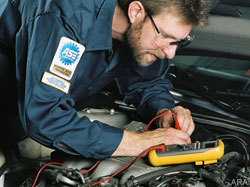Just as cleaning is likely a part of your spring routine, you should consider adding routine vehicle maintenance to your fall to-do list.
When the weather gets chillier, more things can go wrong on the road – from your car not starting in the cold weather to it sliding off the road in the snow because your tires are in poor condition. Since nobody wants to be stranded in the cold, now’s a good time to get your car into the repair shop for a check-up or take a look at it yourself.
The professionals with the National Institute for Automotive Service Excellence recommend checking the following items on your car as winter begins.
Things you can do yourself with proper knowledge after consulting your owner’s manual include:
* Adding fuel de-icer to your tank once a month will help keep moisture from freezing the fuel line. Keeping your gas tank full will also help prevent moisture from forming.
* Scrape away corrosion and clean connections on your battery. Check fluid monthly if caps are removable. Wear gloves and eye protection to avoid contact with corrosive material and battery acid.
* Replace wiper blades and stock up on wiper fluid, as you’ll use more in the winter.
* Check your tire pressure and examine treads for wear and walls for cracking. Rotate as recommended in your manual.
* Check coolant and anti-freeze levels. Use mix recommended in manual.
* Outfit your car with an emergency kit containing warm clothes, road flares, sand and a shovel, a flashlight, high-energy snacks, water and anything else that will help if you are stranded in the cold.
If you don’t feel comfortable doing any of these things, ask a certified auto technician to help. The following are more advanced preparations that should be done by a mechanic or someone with broad knowledge of automotives:
* Fix any engine problems, such as rough starts, rough idling, stalling or diminished power.
* Check the condition of belts, hoses and clamps.
* Check battery charge.
* Examine your car’s exhaust system for leaks or small holes.
* Flush and refill cooling system, if necessary.
* Replace dirty filters, including air, fuel and PCV filters, to make sure your engine is running smoothly.
For more tips and information on ASE-certification programs for mechanics and how consumers benefit, visit www.ase.com.

